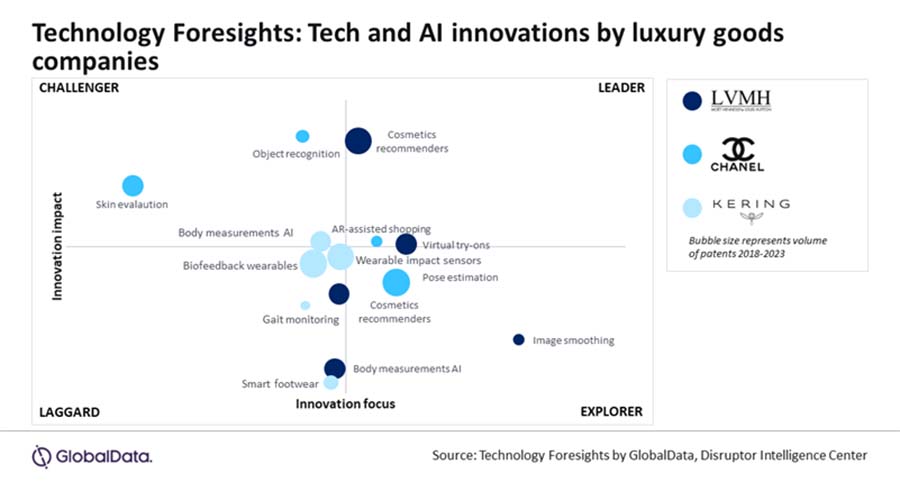Artificial Intelligence (AI) has induced a fresh wave of technological advancement, prompting businesses across various sectors to intensify their efforts to integrate AI capabilities into their products and services.
As the industry grapples with the interpretation of new AI regulations, such as the EU AI Act, investments in AI – particularly in generative AI – are steadily increasing.
Even the luxury goods industry, which thrives on personal touch, is preparing to capitalise on AI. This sector has invested over $360-million in AI over the past three years, marking a significant 79% increase compared to the previous three-year period, according to GlobalData.
Looking beyond investments, insights from GlobalData’s Technology Foresights shed light on the innovations being developed by luxury goods companies and how these firms are utilizing AI to enhance personalisation – a fundamental aspect of luxury products.
The innovation leadership map highlights the significant efforts of major luxury brands such as LVMH, Chanel, and Artemis Groupe, the holding company for Kering, among others. This map selectively showcases the strength of their tech-driven innovations, emphasising the crucial role AI plays in their strategies.

Sourabh Nyalkalkar, practice head of innovation products at GlobalData, comments: “The focus on personalization is evident in the innovations being developed by leading luxury goods companies. These innovations, such as AI-powered cosmetics recommendation systems and body measurement tools, aim to enhance the personal touch in their offerings.
“Cosmetics recommendation systems are designed to consider various user features, both biological and non-biological, to suggest the best products. Meanwhile, AI-based body measurement tools determine a user’s body type in the least intrusive manner to ensure the best product fit.”
This commitment to personalisation is exemplified by companies like Chanel, which is developing a solution that recommends the best matching makeup product based on user-selected images. Similarly, Sephora, a subsidiary of LVMH, is creating a cosmetic recommendation system that scans a user’s skin to analyse features such as skin tone, color, and pigmentation, providing the best matching cosmetic products to the user.
Other companies in the luxury goods sector are also making significant strides in leveraging AI for personalisation. In 2022, Shiseido, the Japanese luxury brand, partnered with the Finnish AI-based beauty platform Revieve to launch a skin analyzer application. This app allows users to upload selfies, which are then analyzed by Revieve’s AI to recommend the most suitable Shiseido products.
Recently, Estée Lauder made a strategic move by investing in the US-based Kiki World, a company that utilises Web3 technologies to co-create products with users, thereby taking personalization to the next level.
Additionally, last week, Cartier, the luxury watch brand, collaborated with Snap to use AI and AR technologies. This partnership enables users to virtually try on rings before making a purchase, enhancing the personalised shopping experience.
Nyalkalkar concludes: “The AI beauty pageant held in April this year, the first of its kind, signals the future direction of the industry. Beauty product companies are beginning to explore platforms where AI-generated models are evaluated and rewarded, allowing them to showcase their products to a broader audience. This development underscores the significance of AI and other technologies in transforming the luxury industry.
“Additionally, the growing startup ecosystem, particularly in Asian countries, is focusing on smart and digital approaches to fashion, which the luxury goods industry should start embracing.”
